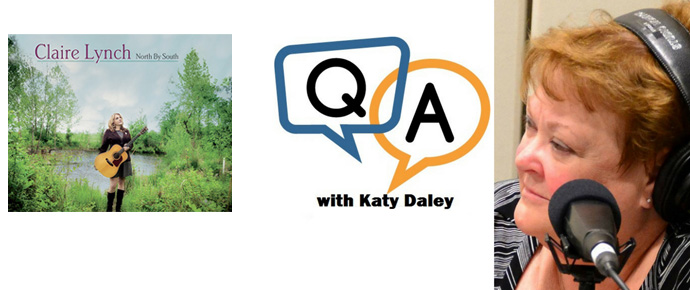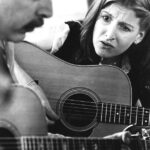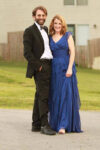
Q&A with Katy Daley is a new, ongoing feature here at Bluegrass Today. The column may be new, but you all know the contributor, Katy Daley, a familiar voice from the Katy Daley Show each weekday morning at WAMU’s Bluegrass Country. As she transitions away from her slot at WAMU, Katy will conduct interviews with bluegrass artists and personalities, bringing her wide knowledge of the music to bear. We are delighted that she will be a regular correspondent at Bluegrass Today.
Here is Katy’s interview with Claire Lynch, among the most celebrated female artists our music has yet produced.
Claire’s album North by South (Compass) is one of 5 nominees for Best Bluegrass Album to be announced the afternoon of Sunday, February 12 at the 59th annual Grammy Awards. Musical success comes from talent, hard work and sometimes a little luck. I asked Claire who or what had brought her luck in her career and personal life.
KD: So Claire, if you could talk about the serendipity in your career and how it’s brought you happiness, success or change in your life. Could be a person or an event.
CL: Well, career-wise I can think of something that happened long ago. And then more recently, something that’s happened on a personal level and a career level, I would say it was Ian [Claire’s husband]. Our meeting, and his support of me and my career, which is something I never really had before. But I can go back to the days when we were playing bluegrass in Alabama almost exclusively. Maybe a little in Georgia and Florida.
KD: This was with the Front Porch String Band?
CL: It was. It was with the Front Porch String Band [circa 1979]. It was when Alan O’Bryant was in the band. So it was Alan O’Bryant, Murray Ross, Billy Sandlin, Larry, and me. The band was great. There was really wonderful energy, great singing and we were creative. We were playing at a festival in central Alabama, near Birmingham called The Brierfield Bluegrass Festival. It was kind of hip. They had not only bluegrass but people like Maura O’Connell and on this particular weekend it was Sam Bush and Newgrass Revival on the bill. So John Starling had just moved to Alabama. He had left the Seldom Scene and had taken up his [medical] practice in Montgomery, Alabama. He heard that Sam and them were coming to Brierfield so he drove up. He was in the audience and he heard me sing along with the wonderful Front Porch String Band. He spoke to Sam about it and to John Cowan. He asked, “Who’s that girl?” and “Can you arrange a pickin’ session with her? I’d like to sit down and sing with her.”
And so, people came to me and said, “John Starling is here and he wants to meet you and pick with you.” (laughter). I was like, “Wow!”
KD: Did you know who he was? I mean you knew his musical background?
CL: Yes, yes. We had bought Seldom Scene records and we were fans. I sat down with him and there’s actually one photograph that was taken of the two of us singing together for the very first time.
KD: What song? Do you remember?
CL: It was recorded as well. I have that on cassette. Yes, we did an Emmylou song because he and Fayssoux Starling had been on Emmylou’s Pieces of the Sky album singing background vocals, and I knew it so I said, (singing) “On the 31st Floor…” What’s that one?
KD: Sin City.
CL: Sin City. Thank you. That’s the one we sang first and then we did some bluegrass numbers. I have a recording of it, if it hasn’t oxidized on a cassette tape. It’s one of those things I’m really desperate to get moved over onto digital. It’s one of the reasons I need to slow down to save that stuff and archive it. And then we got invited, the whole band got invited to his house…
KD: He was in Birmingham?
CL: Montgomery. Way down. They had a beautiful home in the suburbs of Montgomery and we got invited on numerous occasions and we would sit and pick and he would talk about the circles he’d been in, which was not only Seldom Scene but Emmylou Harris and Gram Parsons, and Little Feat
KD: Linda Ronstadt
CL: Linda Ronstadt was a friend of his. Dolly Parton, all those people. And we were just like aghast. We were all ears listening. He loved to talk and tell stories, and then he’d pick with us and then he’d stop and talk about vocal blending or he would talk about arranging a song: “You really want to build it up.” He was like teaching us …
KD: You had never thought of these things or you didn’t know how?
CL: Yeah. I don’t think we’d ever had it put into words. Apparently we were doing something right to grab his attention but he kind of gave us a template for arranging a song, building vocals, “less is more,” tone…
KD: What about song selection?
CL: Song selection was huge. Seems like we played somewhere else and John came and brought Paul Craft, because John and Paul had gone to college together and from there Paul had gone to play with Jimmy Martin on banjo and he was a writer. Paul and John were always sharing songs and Paul was pitching them because he was a publisher by then. He had published The Gambler, which was a huge multi-crossover hit from Country to Pop. Not to mention a movie had been made, The Gambler, and everything else. He was a very successful writer and publisher and he was bent on bluegrass. And so John brought Paul to see me.
Then Paul started calling me and saying, “Send me some of your songs. What have you written?” I wrote that Some Morning Soon, which was birthed out a horrible experience with my ex-husband, and Paul really liked it. And he said, “Make me a demo. Just let me hear it.” I was sitting at my dining room table and in the next room was a parakeet. My son loved parakeets and he always had birds. So it’s chirping and I’m singing “Some morning soon.” He takes that cassette tape and he walks into the A&R (Artists and Repertoire) guy for MCA Records, who was Tony Brown, and sits down and plays it for Tony. (laughter).
Then I got a call from Tony saying come sing on Patty Loveless’ album. I walked into the studio and they said, “We have a surprise for you. We’re cutting Some Morning Soon.
KD: Wow!
CL: Yeah. So I got to sing on that with her. That was all Paul. He took a lot of my songs. He had the fairest publishing deal in the world. He worked with Keith Little and a lot of bluegrass writers. Henry Hipkens, that’s how I met him, who writes that beautiful swing stuff…
KD: Which you do so well.
(laughter) I like to do it, I really do. What Paul would do is, he would say “I’ll pay for the demo, you don’t have to pay for it. If I get it cut, I get publishing. That was it. It was wonderful because you had a demo for your own song and you gave him a shot at getting it cut. He was really fair about it. We couldn’t afford to pay musicians to do a demo, so he did it and he got a lot of good cuts that way. So that was Paul, and Paul pitched me good songs. He pitched me Train Long Gone, which was nominated for Song of the Year with IBMA after New Day came out. He had pitched it to The Osbornes because he knew Bobby and Sonny and they turned it down. So I cut it and got a nice nomination out of it.
KD: For those of us in the Washington area, Paul Craft and Herb Pedersen songs coming through the Seldom Scene were the soundtrack of our lives.
CL: I hear you. Brother Jukebox Sister Wine. Oooh. So John knew a good song and he wrote a few. Mean Mother Blues, he wrote.
KD: Gardens and Memories
CL: And All the Way to Texas.
KD: C&O Canal.
CL: Yep. He’s written a few himself. And I think a good writer knows good songs so they can pick them as well as write them.
KD: If I remember correctly, John was instrumental in getting you a gig at the Birchmere. It was the first time we saw you in the Washington area.
CL: Was I in his band? Or do you mean the Front Porch String Band gig at the Birchmere where about 20 people came? (laughter) That one?
KD: No, I remember it being pretty crowded, actually.
CL: What he did…out of those mentor sessions he said, “Let’s work some songs up, and if I get a gig ‘cause there’s people calling me in Alabama wanting me to come play.” We had a big bluegrass scene in Alabama. We had a couple festivals that were doing really well at the time. They were calling John, so he used us as his band. We became the Ready Section, which was the name of a road out in the county. Ready Section Road was my address so he called the band John Starling and the Ready Section. We got gigs with him and when he went back to Washington. He got a gig at the Birchmere and we played with him. And I sang on his album, Waiting on a Southern Train. Alan O’Bryant was in my band and he sang on that record, too. And Tony Brown had just come off the road with Emmylou and The Hot Band. He had played piano. He had just gotten the A&R job at MCA. It was all intertwined so Tony heard Alan and me sing in that session on John’s album. Then I started getting calls to sing on MCA records. Patty (Loveless) was my first but there were a lot of others.
KD: Like who?
CL: Karen Staley, who’s a fabulous writer, who didn’t make a go of it. Irene Kelley was on MCA the first time I met her. She knew who I was and she said, “I want Claire Lynch to come.” And Carl Jackson and Claire Lynch came and sang background on her record. Her dad died right at the release of her album and she had to abandon all the press because of her father’s death and it went kind of (sound of down), too, so it was very sad.
KD: Too bad because she’s a great singer…
CL: And a great writer. We’ve written a lot of great songs together and we’ve had a lot of success together. Our lives are so paralleled. First time I went to sing for her on her MCA session, I had a two-month old baby. I brought her with me. Irene held the baby and I sang. (laughter) And she had little babies, too, at the time. It was a trip.
KD: Did John give you business advice? Things like how to run a band…
CL: Yes. Lots of things. And he also dropped my name to people. And he wrote, when that first Front Porch String Band album – the one that’s now on or was on Rebel – it was on Leather Records out of Roanoke first. I think he was probably instrumental in my getting attention from them. He wrote a blurb for us and it was like: “The Front Porch String Band is a musical force to be reckoned with. John Starling”
KD: You remember that.
CL: Mmm-Hmm. It was right on the album cover, on the back of it.
KD: Are you and John still in touch?
CL: Yes. I’m more in touch with Cynthia on Facebook. You know, his wife. Last time I played in the area, I was invited to his home for drinks and snacks after the show and we sat down and picked and talked. Last year, well, you were there as you introduced them for the Hall of Fame Induction. I cried all the way through that. To see John standing up there and knowing that Mike was gone and John Duffey (sigh)
KD: Did you want to say anything else about anyone who changed you?
CL: Yes, I would. As of the past 5 or 6 years, this Canadian guy, Ian Gray, came into my life with a fan letter. And it started “come to Canada and play.” We found a lot that we had in common and that we really liked about each other. We were pen pals for two years before we ever met in person but by then he’d already told me that he loved me. It was really great. Skype dating is the bomb ‘cause you get to know the person’s mind.
KD: It’s true, isn’t it?
CL: It really is true. You get to see how they think and what their beliefs are and discuss it ad nauseum. (laughter) His gift, well, when he ran away from home and joined the hippie scene in Toronto, he was what they called “the digger,” the person who would go out and look for resources for the commune to survive. He was like the resource guy. He loves doing that. He loves supporting people and luckily for me, he came into my life. He’s been very practical with his support but it’s more than that. What he’s done is to help me to believe in myself, which is something I never did. Eileen Carson and Mark Schatz did that, too. They told me that I was a Phoenix rising out of the ashes.
Ian saw that in me, too, stuff I didn’t see. So it was that kind of emotional support. He helped me financially, too. He supported me in a lot of ways. He got me out of an apartment and into a house where I was building equity. Those kind of things, too. He believes in my music and what I have to give people. It’s nice. It’s nice to be appreciated for that.
KD: It’s not just Ian. You mean a lot to all of us.
To read more about Claire Lynch, her band, tour schedule, discography and more, visit her online.









